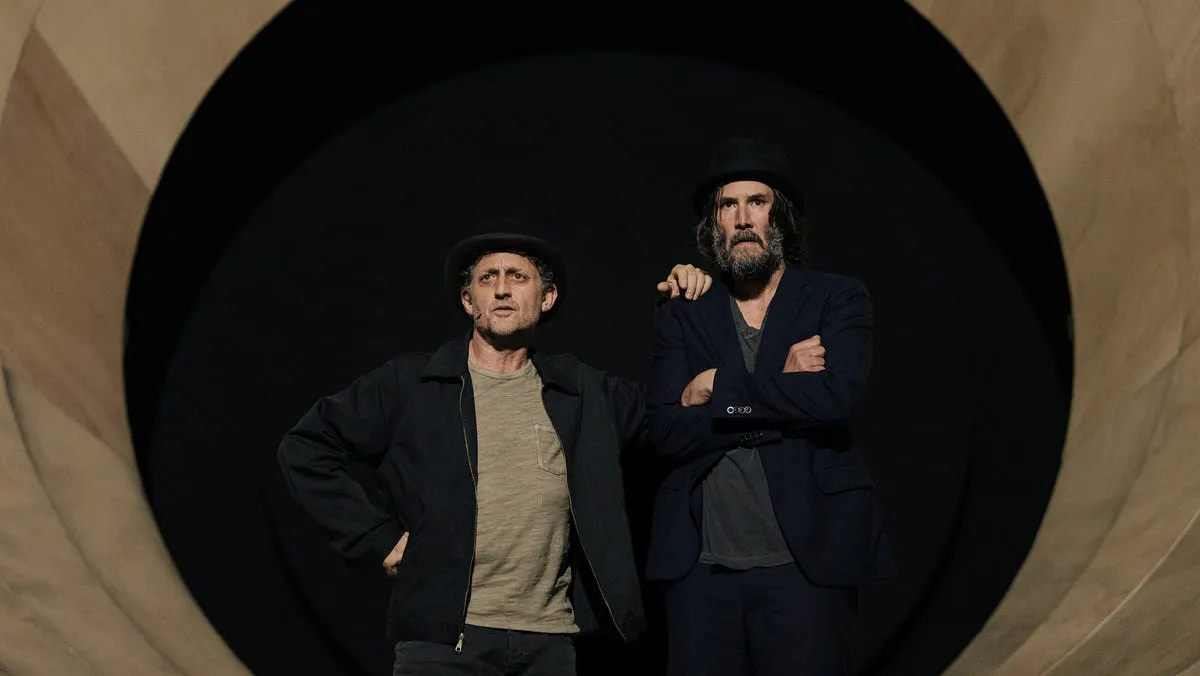
Strange happenings are unfolding at the Hudson Theatre in New York. After a remarkable 36 years since Keanu Reeves and Alex Winter first captivated audiences with “Party on, dudes” in their iconic sci-fi comedy “Bill & Ted’s Excellent Adventure,” the beloved duo has reunited on stage. This time, they take on a challenging new version of “Waiting for Godot,” which premiered on September 28. Samuel Beckett’s absurdist tragicomedy features two old friends, Estragon (played by Reeves) and Vladimir (played by Winter), who engage in idle conversation while waiting for the elusive figure known as Godot.
In this production, Estragon and Vladimir don tattered boots and bowler hats, navigating their bleak existence with humor and camaraderie. Their conversations are frequently interrupted by the pompous passerby Pozzo (Branden J. Dirden) and his tortured servant Lucky (brilliantly portrayed by Michael Patrick Thornton). Each day, a mysterious boy (Eric Williams) arrives to deliver the disheartening news that Godot is not coming, forcing the duo to continue their endless waiting. While some fans of “Bill & Ted” might anticipate a laugh-filled experience, Beckett’s work delves into themes of purpose, uncertainty, and the futility of life, presenting a stark contrast to the light-heartedness of the earlier films.
Director Jamie Lloyd, known for his innovative take on Andrew Lloyd Webber’s “Sunset Boulevard,” brings a unique vision to this revival of “Waiting for Godot.” The set, designed by Soutra Gilmour, features a massive, marble funnel that evokes various interpretations—ranging from a hollowed-out tree to a dystopian skate park. However, this visually striking design sometimes overwhelms the actors, leaving them little space to fully express their characters. The production’s somber tone could have benefited from a director with a lighter approach, as the pacing often feels ponderous.
Despite its challenges, the production is handsomely realized, featuring striking silhouettes by Jon Clark and unnerving sound design by Ben and Max Ringham, which adds a low hum of dread to the existential narrative. The true highlight of the show lies in the performances of Reeves and Winter, whose authentic friendship shines through the play's inherent despair. Their chemistry is particularly evident in the more lively second act, where they exchange witty banter and dark humor with the precision of seasoned performers.
Reeves portrays Estragon with a puppy-dog codependence, leaning on Vladimir as they both grapple with their existential plight. This role marks Reeves’ Broadway debut, and he delivers a poignant performance. However, it is Winter’s portrayal of the more introspective and empathetic Vladimir that leaves a lasting impression. He beautifully captures the character’s hopeful optimism and the crushing realization that Godot may never arrive. Winter’s final monologue, confronting nihilism, is one of the most powerful moments you’ll witness on Broadway this year.
“Waiting for Godot” stands as the feel-bad play of the fall season, yet the transfixing performances from Winter and Reeves help audiences overlook some of the production's shortcomings. Few actors can so eloquently philosophize about mortality, making their portrayal of these characters unforgettable. As Ted famously said, “All we are is dust in the wind, dude.” Don’t miss this thought-provoking revival of “Waiting for Godot,” now playing at the Hudson Theatre (141 W. 44th Street) through January 4, 2026.